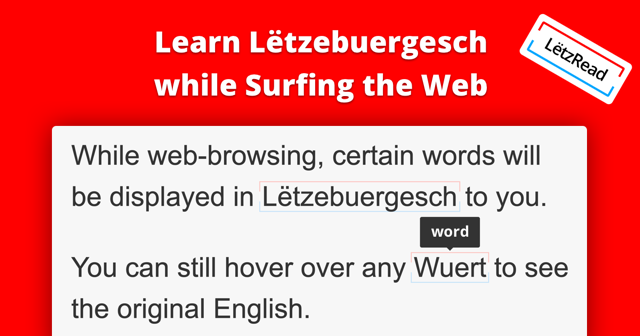 Credit: LëtzRead
Credit: LëtzRead
Tom Faber, a creative technologist from Luxembourg, has announced the launch of a new Luxembourgish language learning tool: LëtzRead.
LëtzRead is a free browser extension (currently available exclusively for Google Chrome) aimed at helping language learners integrate Luxembourgish into their daily lives. Once installed, a user-customisable amount of words on English-language websites will be translated into Luxembourgish. If internet users do not know the word in Luxembourgish, they can hover over or click on the word to view the original in English.
Speaking to Chronicle.lu, Tom Faber explained the inspiration behind LëtzRead and how it functions. "LëtzRead started as a side project of mine", he stated. "As a native Luxembourger, I noticed that many Luxembourgish learners often seek, but do not have the opportunity, to integrate Luxembourgish into their life".
He continued: "While researching language learning options, I got inspired by the concept of the innovative Toucan browser extension (which does the same for other languages). However, as I realised that the Luxembourg market is probably too small for them to justify expanding here, I set out to build my own version for Lëtzebuergesch [Luxembourgish]. Since I already worked on all kinds of digital things, from websites over (web) apps to applied machine learning - but not a browser extension yet - it was also a bit of a matter of personal interest".
Elaborating on the function of LëtzRead, the creator explained: "It works by translating a few words on English websites into Luxembourgish to help you refresh and advance your vocabulary bit by bit. As one of the Sproochentest's [Luxembourgish language test] main parts is about describing a picture fluently, it's certainly valuable to have an expansive vocabulary ready at hand".
Concerning its development, Mr Faber noted: "The idea was to build a free little tool for everyone to enjoy. Yet, development turned out not so little: language processing is complex and some aspects of extension coding proved more challenging and time consuming than anticipated".
Looking towards the future, he explained: "While I think the current state of LëtzRead is mighty useful and I'm happy to further develop it, in order to be able to invest more time into additional functionality (if there's enough demand), I will have to consider adding some paid 'Pro Features' (e.g. audio pronunciations, example phrases, activation by custom time schedule, etc.) for people looking to fast-track their language learning. Of course, it would be best if there was a way to keep new features free for everyone".
In terms of the response of internet users, Tom Faber explained that feedback has so far been predominantly positive. "People are excited to find out about LëtzRead and how it can give them the 'super-power' to easily integrate Luxembourgish into their lives". He added: "That being said, one has to keep in mind that it's a beta version and even the best automatic translation software can err. While I think LëtzRead's overall accuracy is high enough to be useful for vocabulary training, users should expect that there will be occasional words that don't fit, especially when a translation depends on specific context". He explained that the tool works best when casually browsing the web, reading the news or looking at Wikipedia pages in one's spare time.
Mr Faber added that he is open to suggestions for an improved user experience; feedback is welcome via email: LetzRead@tomfaber.id.
LëtzRead is available as a free browser extension via LetzRead.com.








